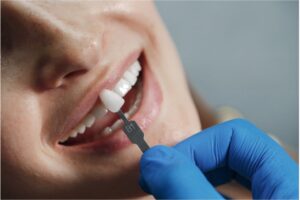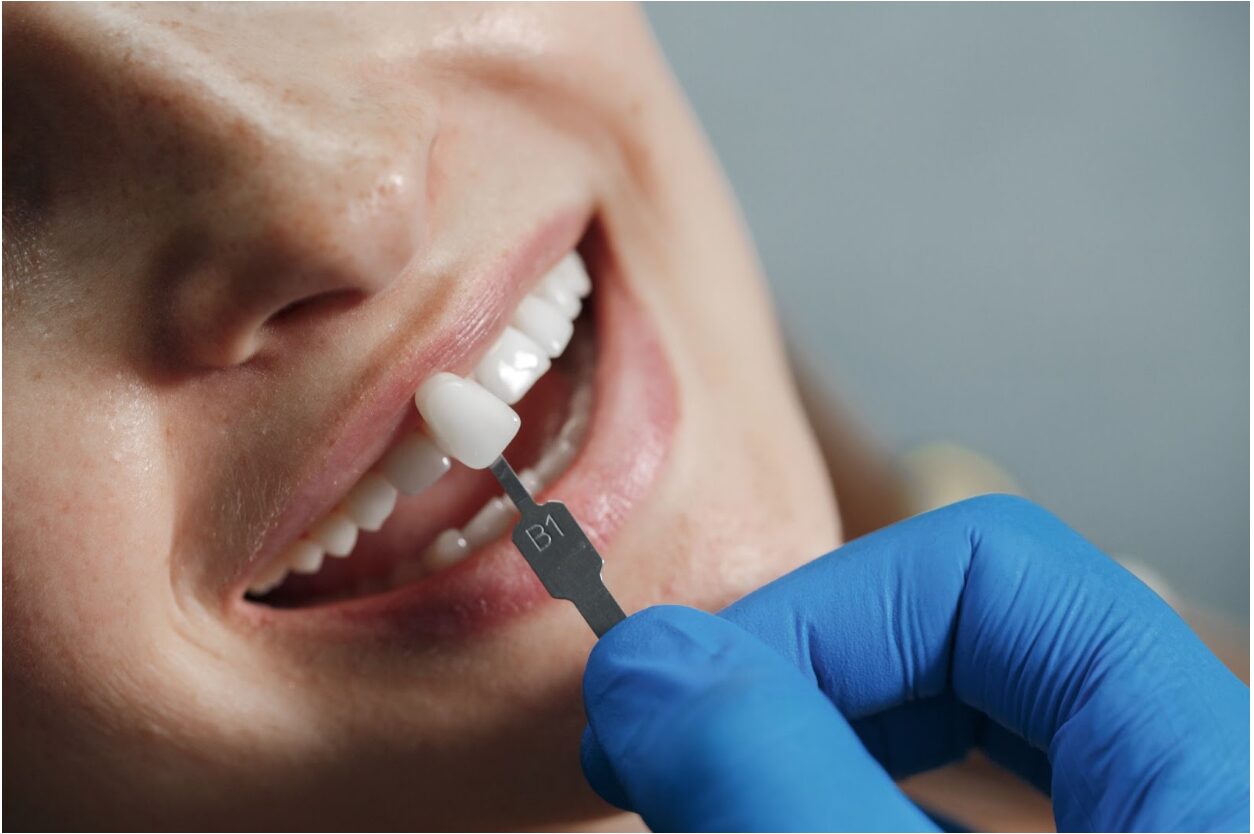
Our teeth are incredibly durable, but they are not invincible. Over time, dental decay, injuries, or wear and tear can take a toll on our teeth. In these instances, dental crowns play an instrumental role in restoring teeth to their optimal function and appearance. Serving as a dental ‘cap,’ they cover damaged or compromised teeth, offering them a new lease on life. Dental crowns not only revitalize the aesthetics of our smile but also reinforce the strength of weakened teeth, enhancing our overall oral health.
What is a Dental Crown?
A dental crown is a custom-designed cover, resembling a natural tooth that is placed over a damaged tooth. Once cemented into place, the crown fully covers the visible portion of a tooth above and at the gum line. Dentists often suggest dental crowns as a means to safeguard vulnerable teeth, prevent fractures in cracked teeth, repair broken teeth, or secure dental bridges in position. They can also cover misshapen or severely discolored teeth, adding to the cosmetic appeal of one’s smile.
While dental crowns are typically custom-made to fit the individual tooth (or implant) they cover, pre-fabricated crowns can also be used temporarily. Custom-made crowns are manufactured in a dental laboratory using impressions of the patient’s tooth for a precise fit.
What are the Types of Dental Crowns?
Dental technology has evolved over the years, offering patients a range of dental crown options. Each type comes with its strengths, aesthetic considerations, and potential drawbacks. Here are the primary types of dental crowns:
Metal Crowns
Metal crowns are made from gold, platinum, or base-metal alloys like cobalt-chromium and nickel-chromium. These crowns are incredibly durable, making them ideal for molars, the ‘workhorse’ teeth at the back of the mouth that do most grinding and chewing. Metal crowns rarely chip or break, last the longest in terms of wear and require only a small amount of tooth removal. However, their metallic color is the main drawback, making them a more popular choice for out-of-sight molars rather than front teeth.
Stainless Steel Crowns
Stainless steel crowns are prefabricated crowns used on permanent teeth primarily as a temporary measure. A dentist may fit a stainless steel crown on a child’s primary (baby) tooth that has been prepared to fit it. The crown covers the tooth to protect it from further decay. When the primary tooth comes out to make room for the permanent tooth, the crown comes out naturally with it. These crowns are cost-effective and practical for children’s teeth.
Porcelain-Fused-to-Metal (PFM) Crowns
Porcelain-fused-to-metal crowns offer a nice balance between durability and aesthetics. They have a stronger structure than porcelain or ceramic due to the underlying metal, and the porcelain exterior can be color-matched to the patient’s natural teeth, providing a more natural appearance than metal crowns. However, they can wear down the teeth opposite them, and the metal under the crown’s porcelain cap sometimes becomes visible as a dark line at the gum line.
All-Ceramic or Porcelain Crowns
All ceramic or all-porcelain crowns are at the top of the range when it comes to matching the color of your natural teeth. They are an excellent option for people with metal allergies. Ideal for front and back teeth, all-ceramic crowns are a perfect combination of strength, durability, and aesthetics, but they might wear down the opposing teeth a little more than metal crowns.
All-Resin Crowns
All-resin crowns are the most cost-effective crown option. Nonetheless, they gradually deteriorate and are more susceptible to fractures than crowns crafted from alternative materials. While they might not be as long-lasting or as strong as other types of crowns, all-resin crowns can be an excellent choice for patients looking for a more economical solution.
Why Are Dental Crowns Needed?
Dental crowns are a highly effective solution for a multitude of oral health issues. They serve a vital role in prosthodontics, the field of dentistry focused on restoring and replacing damaged or lost teeth. Here are several reasons why dental crowns are needed:
To Restore A Badly Decayed Tooth
When a tooth has suffered severe decay, a simple filling might not be sufficient to restore its structure and function. A dental crown can provide the necessary support and protection to the tooth. By covering the decayed tooth entirely, a crown halts further decay, strengthening the tooth and preserving its functionality.
To Replace A Large Worn-Out or Damaged Filling
Over time, large dental fillings can wear out or get damaged, leaving the tooth vulnerable to further decay or injury. In such cases, a dental crown is an excellent solution, acting as a ‘cap’ that provides an added layer of protection, preventing the need for tooth extraction and more complex dental procedures.
To Repair A Cracked, Chipped, Or Broken Tooth
Trauma to the mouth can result in cracked, chipped, or broken teeth. Besides impairing the aesthetics of one’s smile, such damage can lead to discomfort, pain, or infection if left untreated. Dental crowns can cover and protect the damaged area, restoring the tooth’s natural shape and function and preventing further damage or complications.
To Protect A Tooth After A Root Canal
A root canal is a dental procedure performed to remove infected or decayed tissue from inside a tooth. Following a root canal, the tooth often requires a dental crown to reinforce its structure and protect it from fractures, as the tooth can become more brittle and prone to damage after this procedure.
To Cover Up A Tooth For Cosmetic Purposes
In addition to their restorative purposes, dental crowns serve a significant role in cosmetic dentistry. They can cover discolored or misshapen teeth, significantly improving the appearance of one’s smile. With modern dental technology, crowns can be designed to match natural teeth’ color, shape, and size, providing a seamless, attractive result.
How to Maintain and Take Care of Dental Crowns?
While dental crowns are designed to be durable and long-lasting, their lifespan can be significantly extended with proper care. Here are some pivotal steps to ensure the longevity of your dental crowns:
Avoid Sticky, Chewy Foods
Sticky and chewy foods can pose a risk to dental crowns, especially temporary ones, as they have the potential to dislodge them. Foods such as caramel, chewing gum, dried fruits, and certain candies should be consumed sparingly or avoided altogether to protect your crown from becoming loose or falling out.
Avoid Chewing Hard Foods
Hard foods can damage dental crowns, leading to cracks or fractures. It’s advisable to avoid or be very careful when consuming foods like hard candies, ice, raw vegetables, or tough meats. If possible, try using the other side of your mouth to chew hard or crunchy foods.
Minimize Use of the Side of Your Mouth with the Temporary Crown
If you’ve been fitted with a temporary crown while waiting for a permanent one, try to minimize the use of that side of your mouth for chewing. This precaution will reduce the pressure and wear on the temporary crown and prevent it from breaking or falling out.
Slide Rather Than Lift Out Dental Floss When Cleaning
When cleaning your teeth with dental floss, it’s better to slide the floss out from the side of the crown rather than lifting it out. Lifting the floss out can dislodge the crown, especially if it’s temporary.
Maintain Good Oral Hygiene
Maintaining good oral hygiene is fundamental to prolonging the life of your dental crown. Regular brushing and flossing can prevent tooth decay and gum disease, both of which can undermine the health of the tooth supporting the crown. Use toothpaste with fluoride and a soft-bristled toothbrush to prevent damaging the crown surface.
Opt for Interdental Cleaners
Interdental cleaners, such as oral irrigators or dental water flossers, can effectively clean around dental crowns and prevent plaque buildup without risking damage to the crown. They can be an excellent addition to your oral hygiene routine.
Stop Grinding Your Teeth
Grinding or clenching your teeth can cause considerable damage to dental crowns. If you have a habit of grinding your teeth, especially at night, it’s worth discussing with your dentist about getting a night guard. This device will protect your crowns and your natural teeth from the damaging effects of grinding and clenching.
How Long Do Dental Crowns Last?
The durability of a dental crown can greatly differ depending on various factors, like the material utilized for the crown, its placement in the mouth, and the individual’s oral hygiene habits. These aspects play a crucial role in determining the longevity of the crown. Dental crowns typically have a lifespan of 5 to 15 years on average. However, with meticulous care and regular dental check-ups, some crowns can last for decades or even a lifetime.
It’s important to note that even well-cared-for crowns can sometimes become loose or fall out. If you notice signs of wear, damage, or discomfort around your crown, it’s crucial to seek professional dental advice promptly. Regular dental check-ups can also help detect any issues early before they become problematic.
Apostol Dental Cosmetic Center – The Dental Crown Specialist in Makati
At Apostol Dental Cosmetic Center, we understand the importance of a healthy, functional, and beautiful smile. As the leading dental crown clinic in Makati and the metro, we are committed to providing high-quality dental crowns tailored to your specific needs. Our team of skilled dentists and dental technicians ensures that each crown is expertly fitted to give you the comfort, aesthetics, and durability you deserve.
Whether it’s your first time getting a dental crown or you require a replacement, we are here to guide you through every step of the process. We use the latest dental technology and materials to create crowns that enhance your smile and boost your oral health and quality of life. Don’t hesitate to call 0917-8724929 when scheduling an appointment with our high end Makati dental clinic.
FAQs
What Are the Disadvantages of Crowns?
While dental crowns are a highly effective restorative procedure, they do have some potential disadvantages, such as costs, complex procedure, among others:
- It can be costly, depending on the material used.
- The process of fitting a crown can be invasive and sometimes requires tooth structure to be removed.
- It might require more than one dental visit, especially for custom-made crowns.
- There’s a slight risk of sensitivity or discomfort after the procedure.
- Like natural teeth, crowns can still be subject to damage and decay.
Is It Better to Get a Crown or Pull the Tooth?
The decision to get a crown or extract the tooth depends on the extent of tooth damage and the patient’s overall oral health. Generally, dentists aim to preserve the natural tooth as much as possible. This is usually the preferred route if the tooth’s function and appearance can be restored with a crown. Extraction is usually a last resort, followed by a denture, bridge, or implant replacement.
Are Crowns Safer Than Implants?
Both crowns and implants are safe dental procedures but serve different purposes. Crowns are used to cover and protect a damaged tooth, while implants replace the entire tooth, from root to crown, when a tooth is missing or needs to be extracted. The choice between the two depends on the patient’s specific dental needs.


